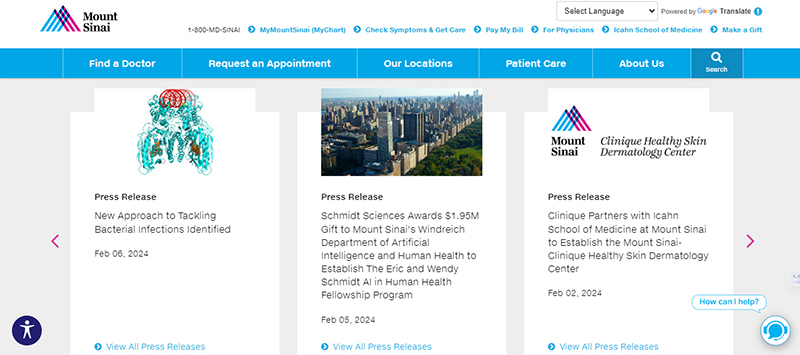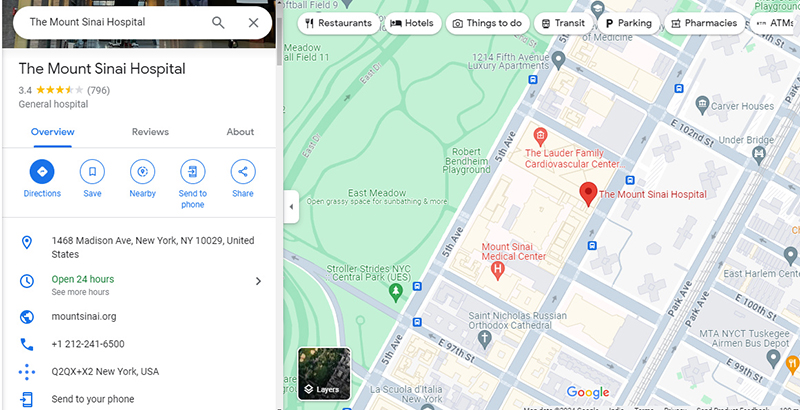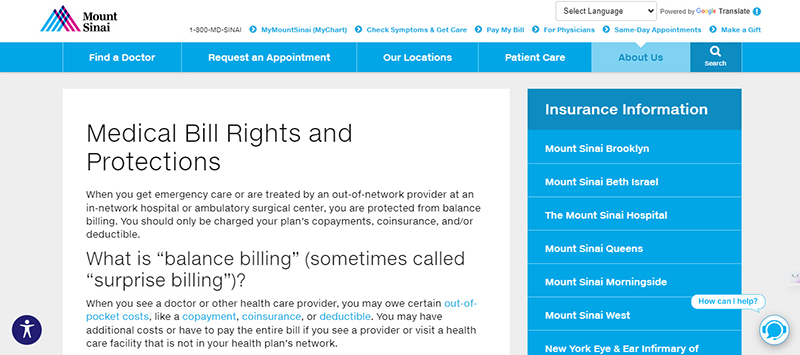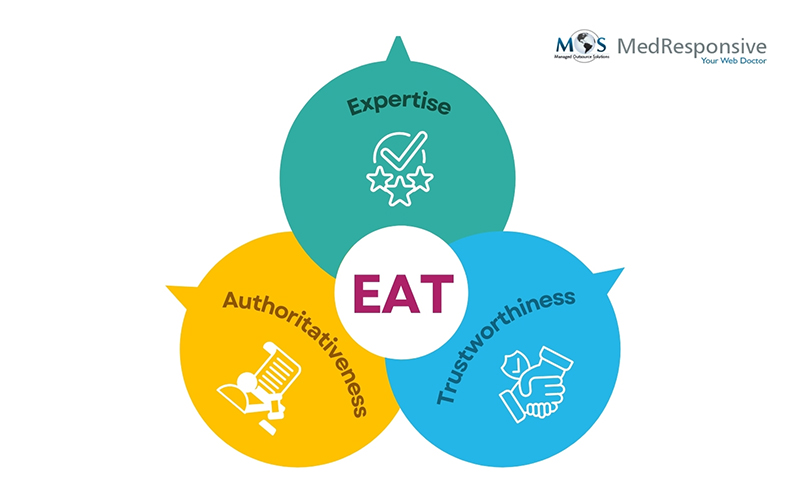Given the growing number of people using the internet, medical professionals need to have a strong online presence. Nowadays, the majority of patients do extensive web research before scheduling a visit with a physician. This demonstrates how important it is for medical professionals to present themselves as the finest in their field and to uphold a positive online reputation. A search’s top result on Google boasts a click-through rate of roughly thirty-one percent. Thus, having a strong SEO strategy is crucial for digital marketing for healthcare.
Impact of Medical Updates on Medical Websites
For each query, Google employs a sophisticated algorithm to determine which results are most relevant. Every year, the algorithm undergoes thousands of small updates in addition to several large ones. A highly ranked website may abruptly disappear from Google’s first page while a previously poorly ranked website soars to the top when the algorithm is altered.
Enhancing the relevance and caliber of search results is the general goal of the majority of Google updates. The medic update was a major algorithmic change that took place in the middle of 2018 and had an impact on health and wellness websites. The Medic update disproportionately affected doctors, even though it did not specifically target the health sector. Numerous online stores offering goods related to health and medicine were also impacted. The impact on numerous websites in the diet, nutrition, and medical device niches was significant.
Search Rankings
Variations in search rankings can be attributed to algorithm updates. Websites that comply with the new ranking criteria might get better rankings, while those that don’t might get worse rankings. Authority, relevancy, and high-quality content are critical for medical websites.
Content Quality
Updates usually focus on the quality of the content. Medical websites that feature reliable, current, and well-researched content are probably going to do better. It is essential to make sure that content is written or reviewed by subject-matter experts.
User Experience
Positive user experiences are prioritized by Google. Updates may be beneficial for websites that load rapidly, are easy to use across devices, and offer a seamless experience. User-friendliness is crucial for medical websites because health-related information is sensitive.
Mobile Optimization
One important component of Google’s algorithm is mobile friendliness. With more people accessing health information via smartphones and tablets, medical websites that optimize their content for mobile devices stand to gain better search engine rankings.
Local Search Impact
Local search factors are significant for medical clinics and practices. Updates may have an impact on local search rankings, highlighting how crucial it is to have correct company information, favourable customer reviews, and local relevance.
Security and Accessibility
Google often favors websites with secure (HTTPS) connections. Accessibility for people with disabilities is also becoming more and more crucial. Keeping medical information available to a broad audience is consistent with Google’s user-centric philosophy.
Backlink Profile
Search rankings are influenced by backlinks’ relevance and quality. While low-quality or spammy backlinks may have a negative effect, high-quality, authoritative backlinks can have a positive impact on the visibility of a medical website.
Core Updates
Every now and then, Google releases major core updates that affect a number of industries, including the medical sector. Maintaining or raising search ranks requires keeping up with these changes and modifying content and SEO tactics appropriately.
Adherence to Guidelines
It’s crucial to abide by Google’s webmaster guidelines. Websites that use deceptive methods or break rules risk being penalized during updates, which will affect their rankings.
Your Money or Your Life (YMYL)
Google uses the term “Your Money or Your Life” (YMYL) to group together specific kinds of online content that have the potential to have a big influence on people’s safety, finances, or general well-being. Since false or misleading information in these areas may have real-world repercussions, Google scrutinizes YMYL content more closely. Websites with YMYL content are supposed to adhere to stricter criteria for reliability, correctness, and quality.
Examples of YMYL content include:
Health and Medical Information
Information about illnesses, ailments, medications, and general health recommendations.
Financial Information
Guidance on mortgages, taxes, retirement planning, investments, and other financial issues.
Legal Information
Content providing legal guidance, legal definitions, and details on legal rights and obligations.
News and Current Events
News and information about current affairs that may have an effect on the financial markets or public safety.
Major Life Decisions
Information offering advice on big life decisions, like big financial obligations, decisions about schooling, and decisions about careers.
Expertise, Authoritativeness, and Trustworthiness (E-A-T)
Google uses three fundamental principles to evaluate the quality and credibility of web content: expertise, authoritativeness, and trustworthiness (E-A-T). This is especially true for topics that are categorized as Your Money or Your Life (YMYL). By adhering to these guidelines, users can be guaranteed accurate and trustworthy information. Here’s a closer look at each component of E-A-T
Expertise
- Definition: The degree of knowledge and proficiency displayed by the authors or content creators is referred to as expertise.
- Implementation: Experts in the field should be the ones creating or reviewing the content. In the case of medical content, this means that the sources should be credible such as healthcare providers or organizations with in-depth knowledge of the subject.
- Example: A physician or other healthcare professional should write or review any articles regarding a particular medical condition.
Authoritativeness
- Definition: The perceived authority or credibility of the website and its writers in a particular field is what is referred to as their “authoritativeness.”
- Implementation: The website needs to become known in its field as a reliable source. Transparent author credentials, institutional ties, and a track record of creating trustworthy content are ways to accomplish this.
- Example: If a website offering financial advice is run by qualified financial professionals or has established a solid reputation within the finance sector, it may be regarded as authoritative.
Trustworthiness
- Definition: The dependability and openness of the information offered are referred to as its trustworthy qualities.
- Implementation: The website’s goal, references, and sources should all be clearly stated, and the content itself should be factual. A website’s trustworthiness can be enhanced by user reviews, testimonials, and other trust-related signals.
- Example: A health website should refrain from making baseless claims, clearly reference relevant medical research, and cite reliable sources.
Since YMYL content has the potential to have a big impact on users’ lives, health, or finances, the E-A-T principles are especially important. These signals are used by Google’s algorithms to assess the value of content and decide where it belongs in the search results. Websites that put an emphasis on E-A-T are more likely to be regarded as trustworthy sources, which raises their search engine ranking.
How to Improve Ranking and Stay Up to Date with Google Updates
Reputation
A minor negative reputation in any industry, or a mixed positive and negative reputation in YMYL websites, is regarded as a low-quality search result. Therefore, it is imperative to conduct thorough reputation research, which includes reading as many reviews and ratings as possible. Thus, whenever feasible, ensure that your patients provide a favorable review and your site receives backlinks from pertinent websites.
Author Biography
Google places a premium on original content and is more concerned with identifying the author of an article on any given page than with the owner of the website. This is particularly relevant to websites with multiple authors, like blogs. The primary content creator’s personal E-A-T is crucial. Thus, be sure to include author bios in blog posts and take down any low-traffic pages that claim to be written by experts who are not medical. Add a doctor’s bio with their qualifications to the website.
Security of the Website
Google does not favor websites with inadequate security because it makes sure its users are not directed to malicious websites. Any website without an SSL certificate is marked as “not secure” by the company’s own browser, Chrome. Thus, ensure that your website uses HTTPS rather than HTTP, and web masters need to take the necessary precautions to guard against malware and hacking.
NAP
Name, Address, and Phone Number, or NAP, are crucial components of any website. Google wants contact and location details for a physical business. Make sure all online forms of your contact information are the same. Should you provide inconsistent or inaccurate information, you risk losing or weakening the authority these links provide. Make sure your listing on Google My Business and other directories is accurate and updated, and double-check that your address or phone number is spelled correctly.
Page Speed
Both search engine ranking and user satisfaction depend on a website that loads quickly. For faster page loads, try optimizing the images on your medical website, using browser caching, and making use of content delivery networks (CDNs).
User Experience (UX)
The user experience has a major impact on search engine ranking. Make sure the layout and menus on your medical website are user-friendly and easy to navigate. Put the needs of the user first in order to lower bounce rates.
Backlink Quality
Reputable sites that provide high-quality backlinks have a big impact on search engine ranking. Concentrate on constructing reputable and pertinent backlinks to your medical website. Steer clear of spammy or low-quality backlinks as they can harm the reputation of your website.
Local SEO Optimization
Make sure your website is optimized for local search if your medical practice treats patients in a particular area. Use local keywords, claim your Google My Business listing, and make sure your contact details and address are correct and consistent on all platforms.
Voice Optimization
Google gives voice search-friendly websites a lot of weight. Make sure your medical website is voice search-friendly to offer a smooth user experience and raise your search engine rankings.
It’s critical to stay current with Google’s algorithms. These days, getting found online when potential patients type in a phrase or keyword is crucial for medical businesses, and it may even make or break the company. The ultimate goal is to satisfy the needs of your target audience by utilizing local search marketing and SEO best practices. Your ranking and your chances of getting to the top of the Google SERP will both increase as a result. In order to increase your website’s Expertise, Authority, and Trustworthiness and to optimize it for increased conversions and targeted traffic, get in touch with a healthcare digital marketing agency that employs a team of experienced experts.
Elevate Your Online Presence Today!
Interact with your audience, and attract new patients to your website.
Use our tried-and-true marketing strategies to promote your brand.








